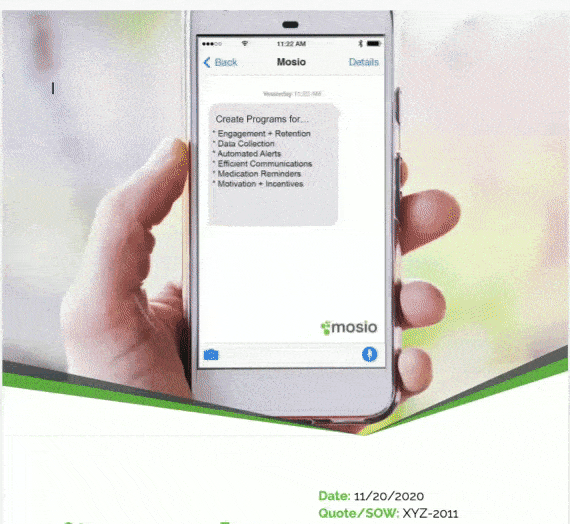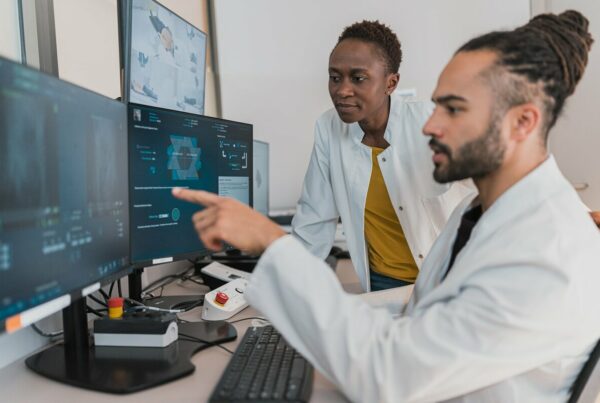Do you know how to manage a siteless clinical trial?
Straight off the bat, here are a few key benefits of using a text messaging solution to manage a siteless clinical trial:
- Streamline communication with study participants.
- Ensure adherence to study protocols.
- Bolster study participant engagement.
This article will break down how you can leverage digital technology to centralize communication for your clinical trial.
What Is A Siteless Clinical Trial?
Siteless clinical trials, otherwise known as remote clinical trials, do not require participants to travel to a physical site. These trials typically utilize a range of digital technology solutions to collect data, monitor participants, and conduct follow-up assessments. The aim of siteless clinical trials is to reduce the burden on participants, improve recruitment rates, and streamline the study process.
Managing A Siteless Clinical Trial (4 Key Steps)
Managing a siteless clinical trial requires careful planning and execution. Here are some essential steps involved in managing a siteless clinical trial:
1 – Define the study objectives
You must ensure the study objectives are clearly defined. The objectives should guide the selection of software and applications to power study processes. With the right technology stack in your corner, siteless clinical trials can run smoothly.
2 – Select the right technology
Siteless clinical trials require the use of technology to collect data, monitor participants, and deliver timely notifications. With no shortage of solutions on the market, there is no reason to settle for anything less than exceptional. The solutions in your technology stack should elevate the quality of the data you are collecting and support compliance with regulatory requirements.
3 – Develop study protocols
Study protocols should outline the procedures for participant recruitment, enrollment, and monitoring. They should also detail the data collection and analysis methods. The right set of applications can support adherence to study protocols and ensure the smooth running of a clinical trial.
4 – Monitor participants
Siteless clinical trials require continuous monitoring of participants to ensure that the data collected is accurate and reliable. The technology selected should either enable real-time monitoring of participants or ensure they receive timely information for adherence to study protocols. For instance, a text messaging solution can ensure participants receive “nudges” to take their medication at exactly the right time.
Text Messaging Solutions In Siteless Clinical Trials (Potential Use Cases)
Text messaging solutions are a powerful tool for conducting siteless clinical trials. Text messaging is a cost-effective and efficient way of communicating with participants, enabling real-time data collection and monitoring.
Here are two potential use cases of text messaging solutions in clinical trials:
Reminders and alerts
Study teams can use text messaging to remind participants about upcoming appointments and assessments. Text messages can also be used to send alerts to participants when new information or updates are available. With instant notifications, SMS communication is the perfect way to immediately grab the attention of study participants.
Data collection
Text messaging makes it easy to collect important study data from participants. They can receive text messages asking them to complete surveys or questionnaires. Text messaging solutions enable teams to contact participants all at once and ensure that surveys and questionnaires are distributed without delay.
Text Messaging Software For Siteless Clinical Trials (7 Key Benefits)
Using text messaging solutions in clinical trials offers several benefits, including:
1 – Improved participant engagement
Text messaging can improve participant engagement by providing real-time feedback and support.
2 – Reduced dropout rates
Text messaging can reduce dropout rates by providing regular reminders and support to participants.
3 – Increased participant compliance
Text messaging can increase participant compliance by providing regular reminders and encouraging adherence to study protocols.
4 – Improved data quality
Text messaging can improve data quality by enabling real-time data collection and monitoring. This can reduce the likelihood of data errors and increase the accuracy of the data collected.
5 – Cost-effective
Text messaging is a cost-effective way of communicating with participants, particularly in large clinical trials. It eliminates the need for paper-based forms and reduces the need for staff to make phone calls or send emails to individuals.
6 – Time-efficient
Text messaging is a time-efficient way of communicating with participants. It eliminates the need for clinical staff to make contact with participants individually, which is often time-consuming and can distract away from other pressing tasks.
7 – Accessible
Text messaging is accessible to a wide range of participants, including those who may not have access to a computer or email. After all, who doesn’t have a mobile phone?
Using Text Messaging In A Siteless Clinical Trial
Text messaging solutions are a powerful tool for conducting siteless clinical trials. To summarize, here are the key benefits of using text messaging in a siteless clinical trial:
- A cost-effective way to communicate with study participants at scale.
- Everyone has a mobile device, making this form of communication highly accessible.
- Study participants can receive regular reminders, helping to boost engagement.
- Improve data quality by ensuring all participants are following protocols for compliance.
Mosio is an all-encompassing text messaging solution for clinical trials. From medication and appointment reminders to automated text messaging, Mosio can promote retention and engagement among study participants and get your study workflows firing on all cylinders.







